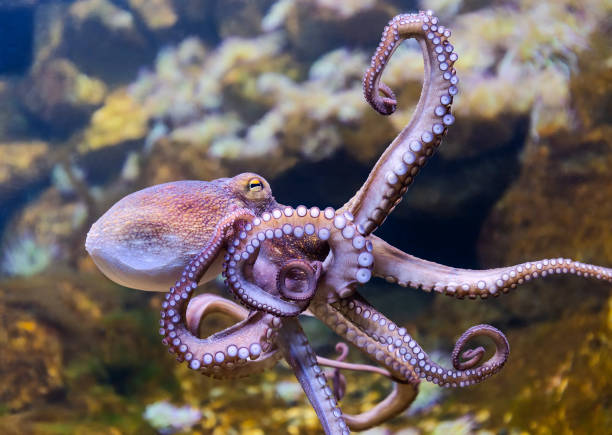Silent Sentinels: The Remarkable Intelligence of Octopuses
The underwater realm harbors countless marvels, but few creatures captivate human imagination quite like the octopus. These eight-armed invertebrates possess intellectual capabilities that challenge our understanding of animal cognition. With their problem-solving skills, memory capacity, and adaptive behaviors, octopuses represent one of nature's most fascinating evolutionary success stories. Their unique nervous system architecture—distributed across their body rather than centralized in a brain—has allowed them to develop intelligent responses to environmental challenges despite following a completely different evolutionary path than vertebrates. This remarkable convergent evolution has produced beings that can learn, remember, and even recognize individual humans, all without the brain structures we typically associate with such abilities.

The Extraordinary Anatomy of Octopus Intelligence
Octopuses possess a truly unique anatomical design that underpins their remarkable cognitive abilities. Unlike mammals, whose intelligence is centralized in their brains, the octopus has a distributed nervous system with approximately 500 million neurons—comparable to a dog. However, only about one-third of these neurons reside in the central brain; the remaining two-thirds are distributed throughout their eight arms, creating a decentralized intelligence network unlike anything seen in vertebrates. Each arm contains tens of thousands of neurons and can act semi-autonomously, solving simple problems even when disconnected from the central brain. This evolutionary adaptation allows octopuses to coordinate complex movements, manipulate tools, and process sensory information simultaneously across their entire body. Their large optic lobes support excellent vision, while specialized cells in their skin enable rapid camouflage changes—all controlled by this remarkable neural architecture that represents a fundamentally different approach to building an intelligent organism.
Problem-Solving Prodigies of the Deep
The problem-solving capabilities of octopuses rank among the most impressive in the animal kingdom. Laboratory studies have documented octopuses navigating mazes, opening childproof pill bottles, and dismantling complex puzzle boxes to access food rewards. Perhaps most famously, octopuses in aquariums worldwide have been known to unscrew jar lids, disassemble water filters, and even escape their enclosures through tiny openings, demonstrating both persistence and strategic thinking. At the Seattle Aquarium, an octopus named Ink gained notoriety for repeatedly flooding the facility by manipulating water valves—seemingly out of curiosity or perhaps boredom. These animals can learn through observation alone, a cognitive ability once thought exclusive to higher vertebrates. They demonstrate clear evidence of both working memory and long-term memory, retaining solutions to problems for weeks despite their relatively short two-to-three-year lifespans. This cognitive flexibility allows octopuses to adapt to changing environmental conditions and develop innovative hunting strategies tailored to specific prey, marking them as true intellectual marvels of the invertebrate world.
Masters of Disguise: Cognitive Control of Physical Transformation
The octopus’s ability to change its appearance represents perhaps the most visually stunning manifestation of its intelligence. Unlike simple reflexive camouflage seen in chameleons, octopus camouflage involves complex cognitive processing and decision-making. Their skin contains specialized chromatophore cells that expand and contract to produce different colors and patterns, papillae that can create textured surfaces, and reflecting cells that manipulate light. What makes this ability truly remarkable is the conscious control octopuses exercise over this system. They assess their surroundings, identify appropriate patterns, and implement sophisticated camouflage strategies—all within seconds. Some species, like the mimic octopus of Indonesia, take this further by impersonating other marine creatures, selecting from a repertoire of at least fifteen different species to mimic based on perceived threats. This requires not only physical transformation but also behavioral mimicry, such as swimming like a flatfish or moving arms to simulate sea snake movements. Most impressive is that octopuses perform these feats despite being colorblind—they can match colors they cannot actually see, suggesting complex processing systems that scientists are still working to understand. This combination of sensory processing, environmental assessment, and physical control represents a sophisticated cognitive system rarely seen outside vertebrate species.
Social Intelligence in a Solitary Species
While traditionally considered solitary creatures, recent research has revealed surprising aspects of octopus social behavior and intelligence. The discovery of “Octopolis” and “Octlantis”—underwater sites off Australia’s coast where normally solitary octopuses gather in groups—has challenged conventional understanding. These communities display complex social interactions, territorial behaviors, and communication systems previously thought impossible for cephalopods. In laboratory settings, octopuses demonstrate clear individual recognition of human caretakers, behaving differently toward people who have previously fed them versus those who have annoyed them. Some individuals even develop preferences for specific caretakers, greeting them with color changes and arm extensions while ignoring others. Their ability to coordinate hunting efforts with fish species represents another dimension of social intelligence, suggesting cooperative capabilities once thought beyond their reach. Studies examining octopus brain activation during social encounters show patterns surprisingly similar to mammals, despite their radically different neural architecture. This emerging research suggests octopuses possess a form of social intelligence that evolved independently from the social cognition seen in mammals and birds, representing a fascinating case of convergent evolution in cognitive capabilities.
Conservation Challenges and Future Research Directions
As our understanding of octopus intelligence grows, so too do ethical concerns about their treatment in laboratories, aquaculture, and the wild. These cognitive marvels face significant threats from climate change, ocean acidification, habitat destruction, and commercial fishing. Current annual global octopus harvest exceeds 350,000 tons, with no comprehensive international management framework in place. Emerging octopus farming initiatives raise additional ethical questions, as confinement appears particularly harmful to these naturally curious and exploratory animals. Conservation efforts are hampered by limited baseline population data and the short, complex life cycles of most octopus species. Research priorities now include developing non-invasive methods for studying wild octopus cognition, better understanding their ecological significance in marine systems, and establishing appropriate welfare standards based on their cognitive capabilities. The price of ignoring these issues could be substantial—both economically and ecologically—as healthy octopus populations play key roles in marine ecosystem balance. Current research funding for cephalopod cognition studies ranges from $50,000 to $500,000 per project, a modest investment considering the potential insights into alternative forms of intelligence. As we continue to discover the depths of octopus cognition, these enigmatic creatures challenge our understanding of what constitutes intelligence and consciousness, offering valuable lessons about the many evolutionary paths to complex cognition in our world’s oceans.
Cultural Impact and Human Fascination
Throughout human history, octopuses have captured our collective imagination, appearing in art, literature, mythology, and popular culture. Ancient Greek pottery depicts octopuses as early as 1500 BCE, while Pacific Islander cultures incorporated them into creation myths and cultural symbolism. The modern scientific understanding of octopus intelligence has spawned bestselling books like “Other Minds” and “The Soul of an Octopus,” documentaries that have reached millions, and viral videos showcasing their problem-solving abilities. Public aquariums report octopus exhibits among their most popular attractions, with specialized interactive displays costing upwards of $100,000 to develop and maintain. This cultural fascination reflects something deeper—octopuses represent a form of alien intelligence evolved on our own planet, challenging our anthropocentric view of cognitive development. Their radically different neural architecture offers insights into alternative evolutionary paths to intelligence, potentially informing fields ranging from artificial intelligence to cognitive science. As humanity continues its search for extraterrestrial intelligence, the octopus reminds us that profoundly different minds already exist in our oceans—evolutionary success stories that developed complex cognition through entirely separate pathways from our own.






